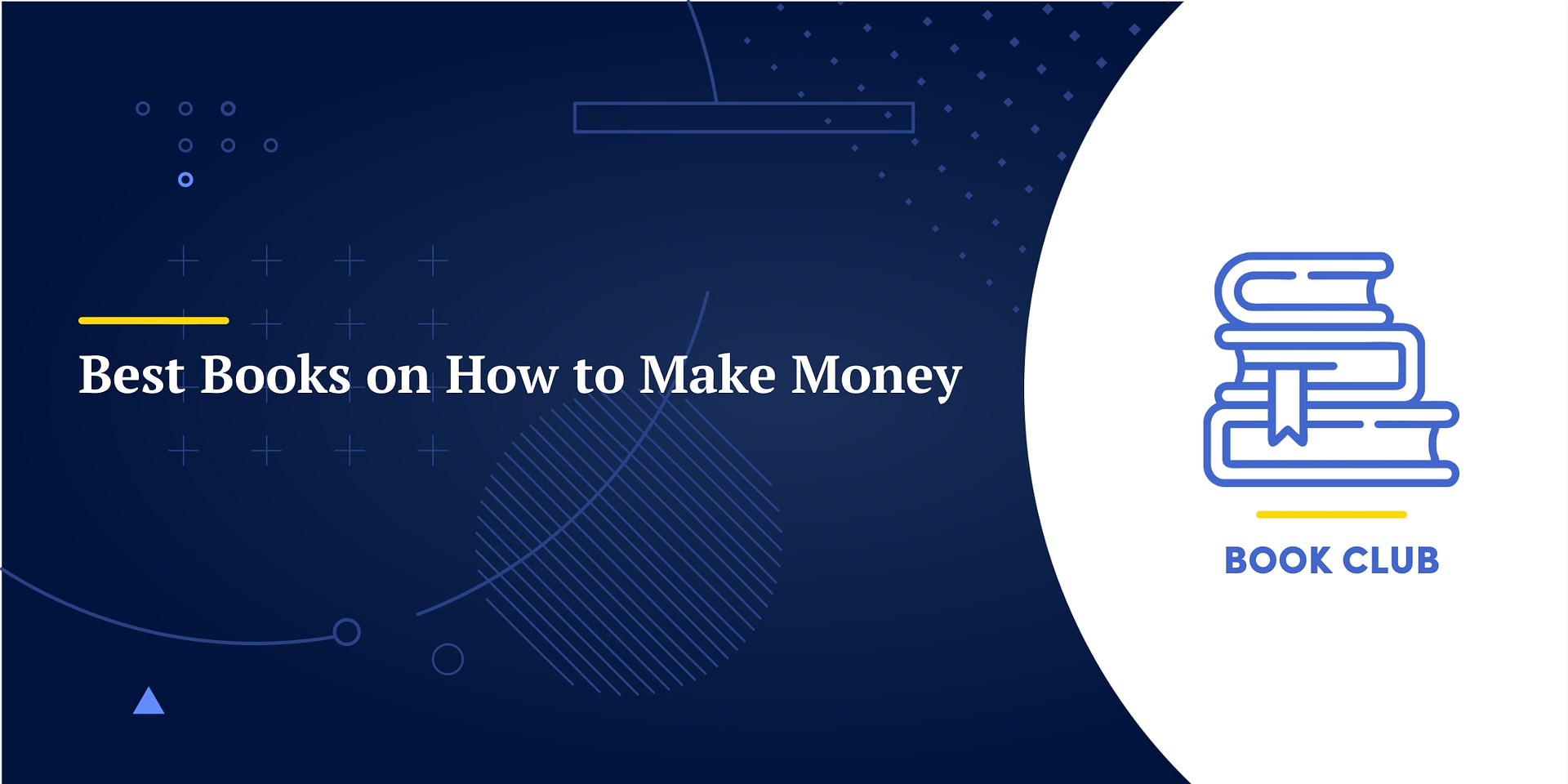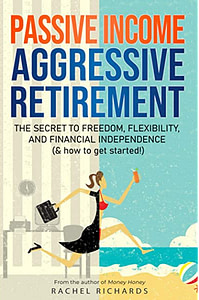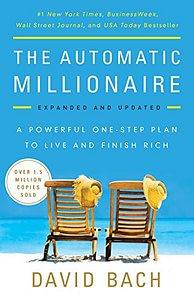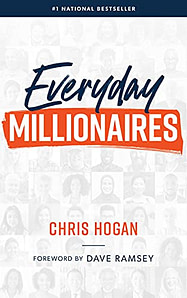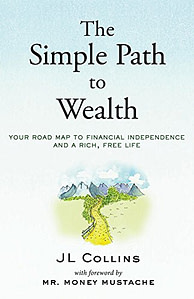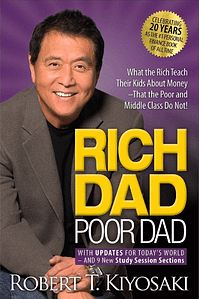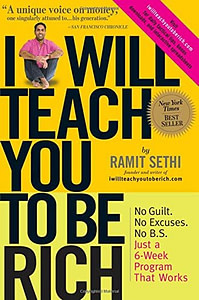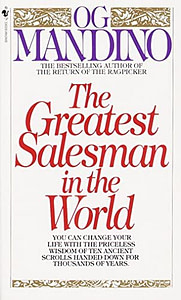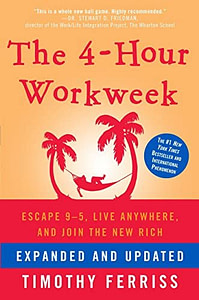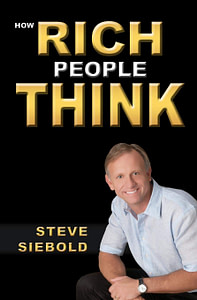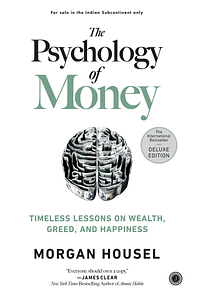Making money is hard, and managing it can be even harder. That’s why as many as one in three Americans have subprime credit and poor personal finances, and 56% don’t have enough savings to cover a $1000 emergency expense[1].
There is no magic trick that brings immediate prosperity, but as with everything else, knowledge helps.
These books offer unique insights and tips that could help you take charge of your finances and start making more money.
by Rachel Richards
“Passive Income, Aggressive Retirement: The Secret to Freedom, Flexibility, and Financial Independence (& how to get started)” may be a mouthful of a title, but it’s one of the most beginner-friendly books on building up a passive income portfolio and setting yourself up for success.
The book is written for anyone who dreads thinking about their nine-to-five job, but it’s primarily aimed at young adults who don’t want to spend their lives penny-pinching and slaving away at the office.
You’ll find practical advice on some of the best passive income opportunities, from collecting songwriting and book royalties to getting into e-commerce, building up your rental income, and more.
Each passive income opportunity is explained in detail, alongside how challenging it is to get into the field and how much time, effort, and resources it would take to make it work, making it ideal for beginners.
None of these approaches are get-rich-quick schemes. They are long-term plans that require the utmost dedication, hard work, and patience. Not all of them will work for any given individual, but you only need one!
What You’ll Learn
“Passive Income, Aggressive Retirement” is filled with detailed guides on unique passive income streams that suit all interests, preferences, and skill levels. Some of the key points include:
- Adopting the SCRIMP approach – Scaleability, Controllability, Regulation, Investment, Marketability, and Passivity;
- 28 passive income models;
- The importance of hard work and continual learning;
- How to negotiate;
- How to play to your strengths.
You’ll find insightful interviews with experts and professionals who’ve successfully built up their passive income portfolios and effectively retired early.
About the Author
“Passive Income, Aggressive Retirement” was written by Rachel Richards, a former financial advisor who retired and started living off $15,000/a month in passive income when she was just 27 years old.
An entrepreneur, investor, and professional speaker, Rachel has written and published another best-selling book on personal finance, titled “Money Honey: A Simple 7-Step Guide for Getting Your Financial $hit Together”.
by David Bach
It’s all in the title – “The Automatic Millionaire: A Powerful One-Step Plan to Live and Finish Rich” is a simple yet insightful guide on managing your finances until you get seven figures in your bank account.
This is a short book you could easily read in a single sitting, but it takes you through the main challenges and financial opportunities you encounter daily, then teaches you how to take advantage of them.
Right off the bat, the book starts with a short story of a typical American couple whose joint income doesn’t exceed $55,000 annually. Still, even with such a limited budget, the couple manages to provide two children with a college education, own two homes, live debt-free, and retire early with a million in their bank.
Though it sounds impossible, it’s very much a reality as long as you remember to invest in yourself first and identify and eliminate small daily expenses that are eating away at your budget: humorously called your “latte factor”.
This book could prove to be just what you need to ensure that a minor setback doesn’t entirely set you back.
What You’ll Learn
“The Automatic Millionaire” provides an easy-to-follow, practical system that can help you control your finances and build your budget. The book teaches you how to:
- Identify your “latte factor”;
- Automatically set money aside in your retirement or investment account as soon as you get paid;
- Increase your monthly contributions to your retirement account;
- Open brokerage accounts;
- Use apps and new technology to increase your savings.
Originally released in 2004, the book was recently updated to include current information on taxes, investment opportunities, new apps, and modern technological solutions you could use to accumulate wealth.
About the Author
“The Automatic Millionaire” was written by David Bach, an entrepreneur, financial author, motivational speaker, and the founder of FinishRich.com.
He’s written multiple international bestsellers, including “Smart Women Finish Rich”, “Smart Couples Finish Rich”, “The Finish Rich Workbook”, “The Automatic Millionaire Workbook”, and “The Latte Factor”, among others.
His “The Automatic Millionaire” was the number one bestseller upon its release in 2004 on The New York Times, Wall Street Journal, USA Today, and BusinessWeek bestseller lists.
by Chris Hogan
Everyday Millionaires” drives home the point that not all millionaires come from old money. Many are ordinary, self-made people who perfected the art of investing, avoiding debt and accumulating wealth.
The book was based on a recently-released study conducted on 10,000 millionaires in the US. The study showed that the majority of them didn’t come from money. They attended state universities, and as many as one in three never made a six-figure salary.
Throughout the book, you’ll find real stories from these self-made millionaires, with detailed explanations of how they achieved success.
While it’s not so much of a practical guide on how to make money, the book can be a great source of inspiration that can point you in the right direction.
What You’ll Learn
“Everyday Millionaires” shares an abundance of helpful information:
- Almost 80% of millionaires in the US didn’t get an inheritance;
- Being disciplined and working hard are the keys to success;
- Avoiding student debt should be your number 1 priority;
- Living below your means can kick-start your financial health;
- Spending money responsibly is critical.
Though it certainly helps to have a safety net provided by parents and family members, it’s not necessary for success. “Everyday Millionaires” highlights how important it is to work on yourself if you want to improve your own financial situation.
About the Author
“Everyday Millionaires” was written by Chris Hogan, a personal finance expert, former radio host, and best-selling author. Working at Ramsey Solutions as a financial coach, Chris has had years of experience teaching others how to achieve their financial goals.
Before he and Ramsey Solutions parted ways in 2021, he hosted “The Chris Hogan Show” podcast, where he offered financial advice to his listeners.
by J.L. Collins
“The Simple Path to Wealth: Your road map to financial independence and a rich, free life” was created for those who are less interested in making millions and retiring early than in ensuring their financial independence as they pursue other things.
The book came from a series of letters between the author, J.L. Collins, and his daughter. Unlike J.L. Collins himself, his daughter didn’t display much interest in financial matters such as trading or investing. She didn’t want money to be her only concern.
So, Collins created an insightful financial guide for all those who want to do other things in life but need financial stability to pursue their dreams.
The book presents simple, clear approaches to making smart investments that don’t require expertise or extensive time commitment.
The author goes over some of the most common investing mistakes – especially the ones he’s made himself – the best approaches to ensuring financial independence, the basics of the stock market, and so much more.
What You’ll Learn
In “The Simple Path to Wealth”, you’ll learn the basics of accumulating wealth, including:
- Why it’s important to have excess money;
- How and why you should avoid debt;
- How you should think about money;
- How the stock market works;
- How to apply the 4% rule to your spending.
The book finishes off with a detailed case study on how all the financial advice included can be applied.
About the Author
As mentioned, the author behind “The Simple Path to Wealth” is J.L. Collins. He has an extensive professional background, from ad agency founder to sales trainer, investment officer, entrepreneur, radio talk show host, and publisher.
He’s best known for his “JL Collins The Simple Path to Wealth” blog, where he shares financial advice and insights with his readers.
by Robert T. Kiyosaki
Perhaps one of the best-known finance books is “Rich Dad Poor Dad: What the Rich Teach Their Kids About Money That Poor and Middle Class Do Not”. The book is based on a simple premise: poor people simply think differently about money than rich people.
While this is to be expected, if you want to stop being poor, you first need to change your mindset and start “playing to win,” not simply “playing not to lose”.
The book teaches you to change your perspective and start building wealth instead of living paycheck to paycheck. It provides sound advice on investing in your future, building up your assets, and making smart investments into properties and businesses.
Though it was considered somewhat controversial when it first came out over 20 years ago, as it discusses how going to school and pursuing education isn’t always the road to financial success, the book has stood the test of time.
What You’ll Learn
“Rich Dad Poor Dad” offers interesting insights into building wealth. From the book, you’ll learn:
- Schools don’t provide enough information to children regarding money;
- You don’t need a high salary to become rich;
- How to teach children about money;
- What assets and liabilities are and how you can use them;
- How to educate yourself to achieve financial stability.
The book is filled with financial tips that can help complete novices learn how to manage their wealth more effectively.
About the Author
“Rich Dad Poor Dad” was written by Robert T. Kiyosaki, a businessman, entrepreneur, and well-respected author. He wrote the book after being inspired by the diverse stories of his father and his childhood friend’s father.
His own father followed the conventional, well-established path, trying to reach wealth by obtaining an education. Still, he ended up struggling financially. On the other hand, his friend’s father was a school dropout and became a self-made millionaire.
by Ramit Sethi
“I Will Teach You to Be Rich” isn’t just another financial advice book. It’s a full six-week program designed to help you get your finances in order and attain wealth.
The book was written for young adults struggling to grasp the concept of money and will help you realize the financial mistakes you’ve been making and offer practical solutions to help you rectify them. Almost every chapter concludes with an actionable step you can take to turn your financial situation around.
Though you certainly stand to learn a lot from “I Will Teach You to Be Rich”, don’t expect just dry text that feels like reading through a workbook. There’s plenty of lighthearted, humorous content, making this book as entertaining as it is educational.
What You’ll Learn
“I Will Teach You to Be Rich” covers important financial topics, helping you understand:
- Automate your finances;
- Open high-interest accounts;
- Master investment strategies;
- Negotiate a pay rise;
- Secure finances for large purchases.
Additionally, the book is filled with diverse, real-life stories showing that your situation isn’t unique. Most people encounter the same financial issues, and nearly everyone can turn their finances around.
About the Author
“I Will Teach You to Be Rich” was written by Ramit Sethi, a personal finance advisor, entrepreneur, and author. Ramit is also the founder of GrowthLab.com, a Finance as a Service company, and co-founder of PBworks, a collaborative editing system.
He has years of experience at sharing his financial insights and helping others achieve financial success.
by Og Mandino
“The Greatest Salesman in the World” is a unique addition to this list, written back in 1968. It’s not a typical financial guidance book but rather an inspirational story that helps teach you how to develop good habits that can ultimately lead to success.
You’ll follow the story of a struggling camel boy who’s on a pursuit to become the greatest salesman in the world.
Though the book has many religious aspects, that doesn’t take away from the lessons it teaches. You’ll find insightful advice on attaining wealth and improving your life overall.
What You’ll Learn
“The Greatest Salesman in the World” is a story with many touching themes and some fantastic advice. Through the book, you’ll learn:
- The importance of developing good habits;
- The importance of building and nurturing relationships with others;
- How to take charge of your emotions;
- How to improve your negotiation and persuasion skills;
- How to improve all aspects of your life.
You don’t need to be or even aspire to be a salesman to benefit from the lessons this book teaches.
About the Author
“The Greatest Salesman in the World” was written by Og Mandino, an author, former insurance salesman, editor, and professional speaker.
Though Mandino doesn’t have much financial background, his philosophies are almost religiously followed by many investors and businessmen attempting to accumulate wealth.
by Timothy Ferriss
“The 4-Hour Workweek” is for all those beginners who want to escape their corporate nine-to-five, work less, and enjoy their life more.
It’s a step-by-step book that aims to help you understand the importance of hard work and provide the tools you need to create a business that lets you lead the life you’ve always dreamed of.
It’s not precisely a book on how to become a millionaire because you don’t have to be a millionaire to enjoy a fulfilling lifestyle. It’s a book on creating new opportunities for yourself and developing a lifestyle that suits your wants and needs.
What You’ll Learn
“The 4-Hour Workweek” offers dozens of actionable tips and tricks to help you gain financial independence. Some of the most important lessons you’ll learn from the book include:
- How to find your purpose;
- How to manage your time more effectively;
- How to partner with others to achieve success;
- How to make your life easier by charging a premium;
- How to validate your business ideas.
As it was written in 2007, the book has some outdated advice, but many of the tips and tricks are still valid to this day.
About the Author
“The 4-Hour Workweek” was written by Timothy Ferriss, an author, podcaster, entrepreneur, and investor. He is best known for his “4-Hour” series, publishing books such as “The 4-Hour Workweek”, as well as “The 4-Hour Body” and “The 4-Hour Chef”.
by Steve Siebold
“How Rich People Think” shares some similarities with another title on this list: “Rich Dad Poor Dad”. Though they’re vastly different works, they both center on the idea that rich people have different mindsets, habits, and beliefs that help them ensure better wealth accumulation.
The book was written after extensive research on millionaires and billionaires and their habits. The author believes that it’s possible to achieve financial success by learning how rich people think and behave, then copying them.
It’s an insightful, if somewhat blunt, guide on what it takes to improve your financial standing and accumulate more wealth.
What You’ll Learn
“How Rich People Think” offers unfiltered advice from some of the most successful people in the world. You’ll learn the following:
- The importance of saving and investing;
- The benefits of taking calculated risks;
- The importance of being fearless;
- How to build wealth;
- The benefits of changing your mindset about money.
Throughout the book, the author is brutally honest and, at times, even harsh. However, there’s no denying that the advice offered can be quite useful.
About the Author
“How Rich People Think” was written by Steve Siebold, an author, speaker, and financial expert. He’s worked as a consultant at numerous renowned businesses, including Johnson & Johnson, Yamanouchi, and GlaxoSmithKline.
To write “How Rich People Think”, Steve interviewed over 1,300 self-made millionaires and billionaires, trying to understand how they think about money and behave.
by Morgan Housel
The Psychology of Money” is one of the most astute personal finance books on this list. It highlights the importance of changing your perception of money as a way to ensure your own financial independence.
Wealth isn’t a matter of simple math. It’s about how you behave, think, and interpret the world around you.
The book goes over the common misconceptions about wealth and how many people believe that wealth is inherited rather than earned. This view and personal biases about money can prevent you from achieving your full potential and ensuring your financial success.
What You’ll Learn
“The Psychology of Money” offers insights and advice to help you gain financial freedom. Some of the things you’ll learn from the book include:
- How greed can lead to grave financial mistakes;
- How envy can give you false perceptions about wealth;
- How early life experiences affect your approach to money;
- How important it is to change your mindset about money;
- How important it is to change your behaviors if you want to accumulate wealth.
Making the right financial decisions is only possible when you take control of your emotions, become aware of your biases, and change your behaviors.
About the Author
“The Psychology of Money” was written by Morgan Housel, an author, former columnist at “The Motley Fool” and “The Wall Street Journal”, and a partner at the Collaborative Fund.
He has won numerous awards, including The New York Times Sidney Award and the Best in Business Award from the Society of American Business Editors and Writers.
Conclusion
No single book offers a key that guarantees financial success, so you shouldn’t expect to become a millionaire overnight after reading one (or all) of the books mentioned in this list. However, following the advice you’ll find in the aforementioned texts can help get you closer to financial freedom and independence.
It’s worth giving these books a try and combining the hundreds of pieces of advice you’ll read into a set of financial steps that suit you, your interests, and your lifestyle.

